-
Genre: Metalcore / Screamo / Post-Hardcore
Label: Self-production
Playing time:
Band homepage: -
Tracklist:
-
WHY LAZY – Dying In The Dream
-
NEWTANK – The Dreamer
-
MEAT SUCKS – Buried The Truths
-
ORDNANCE – Ask For A Justification
-
PARTISAN – Selfish
-
MONKEY KING – Until You Come
-
MULTI-EGO – End Of Me
-
MENSHENG -故謠 Ballad Of Fallen
-
DIE IN VELVET -每天生每天死
-
ASHTEMATO – Joker
-
SAVING MOLLY – To My Friend
-
LUKTOMO – We Are Luktomo
-
BEYOND CURE – Self Destruction
-
DUSTFALL – Dawn Late
-
THYHAZARD – Liar
-
KING LY CHEE -在路上 (feat. Andre Neufeld of COMEBACK KID)
-
SHUT UP! SHUT DOWN! – Bros Holds On Firm Bloods
-
RAVING JOKES – No Vain
-
THE FALLING – Circle II Circle
-
MARY DOLLS - 2012

“Core In China” is a free compilation of different Chinese Core bands. You get everything in here from Post-Rock over Metalcore to Screamo and Emo music. The project was kicked off by the recommendable website Rock In China and I hope that the website will realize similar projects in the future.
What we have here is not only quantity but also quantity. Usually, I’m not all too much into the Core subgenre because I think it’s sometimes too hectic and aggressive but I have already stumbled over a few great Chinese bands with Metalcore influences like EGO FALL or TAROT SAINT for example and I somehow like the Eastern genre bands more than the Western ones because they often mix their sound with original elements from folk instruments over electronic samples. That’s why I had checked out this compilation and I didn’t regret it at all and know a few more talented newcomers from a fascinating country now.
The first song by WHY LAZY already surprises the listener with discordant guitar sounds. It then includes slow and dark passages but also quite aggressive up-tempo parts as well. Apart of the strange clean vocal effects, it was the calm closing part with a girl speaking along in English that really grabbed my attention. To keep it short, this band already includes more ideas in one original song than other bands put in entire albums.
Another highlight for me was the song by MEAT SUCKS where harsh vocals meat great and passionate female clean vocals. The melodic parts of the song and especially the dreamy piano closure with the breathing noises create a fascinating melancholic atmosphere.
PARTISAN surprise with a few Punk and Thrash Metal influences while the melodic chorus sounds really cool in contrast to the harsher verses.
MENSHENG offer a quite weird contribution by presenting us a song with desperate out-of-tone vocals, spoken word passages and quite calm parts that are almost progressively inserted into the unchained harsher parts. If Metalcore would always sound that original and diversified I would listen to it way more often. These bands are not only great ambassadors for the People’s Republic of China but also for the Core scene that many traditional Metal fans underestimate.
The greatness doesn’t stop there. ASHTEMATO mixes Death, Groove and Thrash Metal with Dubstep. This sounds really weird at first try but this original track is quite a grower even though it remains tough to digest. Only the melodic vocal parts could still be a little bit less out of tone to get a better result.
Another favourite song of mine comes from the band LUKTOMO that mixes laid back but original electronic music with emotional Metalcore elements. With a length close to seven minutes, it’s by far the longest song on here but it never gets boring and doesn’t fail to impress and surprise at each new subtle turn and twist. The musical concept of this band is surely interesting and I will try my best to listen to more music from them.
THYHAZARD is another band with amazingly vivid electronic influences, sharp riffs and extreme vocals. The band is though pure chaos like STRAPPING YOUNG LAD or you can also imagine a dark Metalcore mixture of UNEXPECT and SYSTEM OF A DOWN for example. That’s probably the kind of music KORN wanted to create with their electronic album experiment two years ago. This kind of music requests a lot of attention and time but in the end you often get rewarded as even such a chaotic track has its catchy parts.
As you can see, there are a lot of courageous, dynamic and experimental Core newcomers that gathered their forces to contribute to a truly rewarding compilation record. There are a few misses here and there among the twenty artists from my point of view but the number of captivating acts largely exceeds the bands that I like less.
If you are honestly open for diversified Modern Metal music and ready to discover new shores instead of sticking to all too traditional values, this compilation was also made for you. Anyone who profoundly hates the Core genre and thinks it has no place in the Metal scene won’t get convinced but he or she wouldn’t even give these great bands a fair chance anyway. If you belong to the first category of Metal music fans, go on and give yourself a little gift by enjoying the entire compilation for free under the following link:
http://coreinchina.bandcamp.com/
(Online September 5, 2013)
-
-
Liebe Leserinnen und Leser!
Aus gegebenem Anlass folgt hier eine Analyse der medialen Auftritte der fünf wichtigsten Parteien Deutschlands zweieinhalb Wochen vor der Bundestagswahl.
Hier könnt ihr aber selbst für eure Favoriten abstimmen. Wer wird nach der Bundestagswahl Deutschland eurer Meinung nach regieren?
http://kluseba.eklablog.com/wer-wird-nach-der-bundestagswahl-deutschland-regieren-s132327
Nach Kanzlerduell und TV-Dreikampf – wo steht Deutschland zweieinhalb Wochen vor den Wahlen wirklich?
Deutschland ist spätestens nach dem stark mediatisierten Duell zwischen der Kanzlerin der CDU/CSU-Fraktion Angela Merkel und dem Herausforderer der SPD Peer Steinbrück sowie dem kleineren TV-Dreikampf zwischen Rainer Brüderle der FDP, Jürgen Trittin von Bündnis 90/Die Grünen und Gregor Gysi von Die Linke in den letzten Tagen jetzt voll im Wahlkampffieber. Die Prognosen sahen eigentlich klar die schwarz-gelbe Koalition aus CDU/CSU und FDP vorne, doch seit dem Kanzlerduell konnten Peer Steinbrück und seine Partei ein wenig aufholen. Ob dies aber reichen wird und ob gerade die unentschlossenen Wähler und diejenigen, die gar nicht wählen wollen, weil sie das Vertrauen in die Politik endgültig verloren haben, nach den Duellen ihre Meinung gefunden oder geändert haben ist sehr unwahrscheinlich, denn einen klaren Sieger gab es bei keinem der Duelle. Und in Krisenzeiten wählt die Bevölkerung ohnehin eher konservativ in dem Sinne, dass sie den bereits regierenden Parteien wieder das Vertrauen schenkt.
Entschieden wird das Duell aber ohnehin auf der Nebenbühne, denn die Frage, die sich wirklich stellt ist, ob die schwarz-gelbe oder die rot-grüne Koalition eine klare Mehrheit erringen können. Welche der kleinen Parteien wird das Zünglein an der Waage spielen?
Umfragen zufolge wird dies alles ein sehr knappes Rennen werden und somit gäbe es diverse mögliche Alternativkonstellationen. Viele tippen auf eine große Koalition zwischen CDU/CSU und SPD mit der sowohl Merkel als auch Steinbrück schon Erfahrung und in der sich beide auch gegenseitig schätzen gelernt haben. Die Linke erklärt sich bereit auch als dritte Partei mit SPD und Bündnis 90/Die Grünen regieren zu wollen, wenn gerade die SPD der Linksfraktion ein wenig entgegen käme. Andere plädieren dafür, dass Bündnis 90/Die Grünen anstelle der FDP oder auch gemeinsam mit der FDP mit CDU/CSU an die Macht kommen sollen.
Auch wenn viele Politiker diese Konstellationen ablehnen und dementieren: Wenn das Volk am Ende so wählt, dass es keinen klaren Sieger gibt, dann wird den Parteien gar nichts Anderes übrig bleiben, als miteinander zu kooperieren und zu reden, denn Neuwahlen kann man sich gerade in der aktuellen europäischen Krise als führende Nation der Europäischen Union nicht leisten ohne dabei das Gesicht zu verlieren.
So herrscht noch viel Unklarheit und wir wollen uns auf das konzentrieren, was klar ist: Das Abschneiden der Kandidaten und ihrer Parteien während der beliebten TV-Duelle. Da ich kein Anhänger einer bestimmten Partei bin, könnte die Analyse durchaus relativ objektiv ausfallen, denn bislang ist es ja so, dass das jeweilige Lager seinen Kandidaten eindeutig für den besseren hielt.
Lassen wir den kleineren Parteien den Vortritt. Fangen wir mit dem Auftritt von Gregor Gysi für seine Partei Die Linke am vergangenen Montag an. Von allen drei Kandidaten wirkte er am erwachsensten, fairsten und ruhigsten. Seine Erklärungen waren meist klar und sein Verhalten gegenüber den Moderatoren und Kollegen in der Regel souverän. Er fiel den beiden anderen Kandidaten selten ins Wort, brachte seine Meinung meist auf den Punkt und redete nicht unnötig viel herum. Hin und wieder stellte er sogar klar, dass seine Partei auch keine Wunder wirken könne und stimmte seinen Kollegen und besonders Jürgen Trittin hin und wieder sogar bei einigen Aussagen zu. Das Ganze wirkte sehr ehrlich und vor allem menschlich. Diese Einstellung ist natürlich auch taktisch klug, denn Die Linke muss ja wohl mit Bündnis 90/Die Grüne kollaborieren, wenn sie an die Macht kommen will. Ein ständiger Angriff auf den Kollegen wäre da sicherlich ein wenig kontraproduktiv gewesen. Auf der anderen Seite ist man von Gregor Gysi aber auch rhetorisch noch stärkere Auftritte gewöhnt. Man vermisste bei ihm bei all der Souveränität so ein wenig das Feuer und den unbändigen Siegeswillen. Er stellte die Ideen seiner Partei zwar gut vor, aber ein wirklich überzeugendes und schlagfertiges Argument für seine Partei konnte er nicht platzieren.
Jürgen Trittin von Bündnis 90/Die Grünen fing beim Dreikampf sehr gut an. Er wirkte elegant und ruhig, fast schon überaus sympathisch, wie man ihn bislang gar nicht kennt. Er strahlte Erfahrung aus und fand eine gute Mischung aus sachlichen Erläuterungen angereichert mit auswendig gelerntem Fachwissen und einigen kleineren Attacken in Richtung der beiden anderen Kandidaten und besonders natürlich gegen Rainer Brüderle und die FDP. Mit der Zeit ließ Trittin sich aber viel zu sehr in Streitereien und kleinere Scharmützel mit Rainer Brüderle verwickeln und kam ein wenig aus dem Konzept. Zudem riss er die Diskussion an sich und redete mehr und mehr, ohne wirklich viel zu sagen. Er wollte das Duell dominieren und ein wenig eine Show abziehen, allerdings wirkte dies schnell ermüdend und repetitiv. Das Feuer war also gewiss vorhanden, aber sein Auftreten hätte strukturierter und mehr auf den Punkt gebracht sein müssen und gegen Ende mangelte es ihm gar an Souveränität. Er bezeichnete Rainer Brüderle als „Lügner“ und beharrte auf dieser Meinung auch als die beiden Moderatoren schlichtend eingreifen wollten. Selbst wenn er mit dieser Aussage recht hatte, so klang die Bemerkung unprofessionell und eingeschnappt und dies gerade in Hinblick darauf, dass beide Parteien vielleicht dazu gezwungen sind miteinander zu regieren.
Rainer Brüderle von der FDP war nicht nur physisch zwischen den beiden anderen Kandidaten platziert worden, sondern wurde auch rhetorisch immer wieder von ihnen in die Zange genommen, was natürlich daran liegt, dass seine Partei gemeinsam mit der CDU/CSU an der Macht ist. Darauf war er aber perfekt vorbereitet, denn der Kandidat ließ sich zunächst selten aus der Ruhe bringen, verteidigte die Positionen seiner Partei souverän und ließ keinen Angriff unbeantwortet ohne ausfallend zu werden. Auch er konnte mit Fakten glänzen und mit seinen Aussagen wirkte die so gespaltene FDP mit einem Mal gebündelter und klarer ausgerichtet als sonst. Seine Antworten waren logisch und bündig. Im Laufe des Duells provozierte er natürlich die beiden anderen Kandidaten, um sich ein wenig Luft zu verschaffen, was taktisch geschickt war. Gregor Gysi agierte souverän und ließ sich darauf kaum ein, aber mit Jürgen Trittin kam es zu einigen sehr angeregt geführten Diskussionen. Dabei vergriff Brüderle sich zwar nicht so sehr im Ton wie der Kollege, aber sein Vergleich mit der Pannenstatistik eines Fiat Puntos wirkte unangebracht und eher humoristisch wertvoll. Zudem verfiel er unter Aufregung hin und wieder in eine schnellere und genuschelte Aussprache, sodass man ihn manchmal wirklich nicht verstehen konnte.
Insgesamt fiel bei dem Dreikampf positiv auf, dass sich alle drei Parteien klar voneinander abgrenzten und wirklich eine gegenseitige Diskussion suchten. Bei der brauchten sie die Moderatoren gar nicht, die streckenweise unschön durch unqualifizierte Meinungsbekundungen auffielen und ansonsten fast schon hilflos passiv wirkten. Insgesamt haben sich alle drei Politiker mit vielen Stärken und einigen Schwächen präsentiert. Einen klaren Sieger gibt es für den neutralen Beobachter nicht und es ist dann wohl einfach Meinungssache, welcher Kandidat seine Partei und sich hier am besten verkauft hat.
Bei dem großen Duell zwischen Merkel und Steinbrück war die Situation eine ganz andere. Die Moderatoren waren klar in der Überzahl, unterbrachen manchmal viel zu oft und gestalteten die Diskussion streckenweise eher wie ein Verhör. Auch hier konnte man bei den Moderatoren leider unangebrachte persönliche Meinungen heraushören und es gab gerade gegen Herausforderer Peer Steinbrück die ein oder andere Stichelei oder bewusst auf ihn zugeschnittene Frage. Das mag für manche unterhaltsam sein, aber hier geht es um Bildung, Objektivität und Politik und nicht um eine Sonderausgabe einer Talkshow oder gar von „TV Total“. Daran sollte sich die Moderation beim nächsten Mal noch mehr halten.
Viel wichtiger ist aber wie sich denn die beiden Kandidaten geschlagen haben. Peer Steinbrück behielt trotz seiner schwachen Umfragewerte und einigen gehässigeren Kommentaren meist die Ruhe. Er gab sich abgeklärt, intellektuell, klar positioniert und wortgewandt. So menschlich und sympathisch wie bei diesem Auftritt hat man ihn noch nie erlebt. Allerdings wich er einigen unangenehmen Fragen weniger ruhmreich aus und seine Reaktion auf das Thema der Politikergehälter wirkte geradezu hilflos. Er trug die Anliegen und das Programm seiner Partei zwar gut vor, allerdings nahm er viele Angelegenheiten zu persönlich. Man gewann so manchmal den Eindruck, dass es ihm in erster Linie um sich selbst, dann um seine Partei und zuletzt um die Bürger der Bundesrepublik Deutschland geht. Das ist sicherlich ehrlich und der Wahrheit entsprechend, wirkt aber für einen solchen Kandidaten tölpelhaft herübergebracht und nicht gerade volksnah. Auch verpasste er einige Gelegenheiten seine Kontrahentin festzunageln und ihre Regierungsarbeit zu kritisieren. Natürlich gab es einige faire Angriffe und Diskussionen, aber im Grunde hatte man den Eindruck, dass sich da zwei Kandidaten gegenüber standen, die sich eigentlich viel zu sehr ähneln und schätzen, um sich in diesem Format ernsthaft zu duellieren. So wirkte das Ganze eher wie ein Verhör gespickt mit Monologen, als wie eine ernsthafte Diskussion. Dennoch hat Peer Steinbrück unter dem Strich seine Sache nicht schlecht gemacht. Viele Bürger kritisieren auch weiterhin, dass die SPD sich immer mehr der CDU/CSU angleicht und man sich gegenseitig Wahlkampfthemen klaut, aber an diesem Abend wurden doch noch einmal einige Unterschiede deutlich gemacht. Der Kanzlerkandidat wirkte herzlicher und ruhiger als sonst und war sehr gut auf die verschiedenen Themen vorbereitet, sodass am Ende doch ein eher positiver Eindruck bleibt.
Angela Merkel agierte auf einem ähnlichen Niveau wie Steinbrück. Angriffe auf den Kollegen gab es fast nie und sie behandelte ihn, die Moderatoren und die Zuschauer mit viel Respekt und Sachlichkeit. Sie wirkte herzlich, optimistisch und souverän. Nachdem sie in der Vergangenheit manchmal etwas kalt und unnahbar wirkte, gab sie sich jetzt als schützende Mutter der Nation und das steht ihr auch besser. Sie strich die Erfolge ihrer Amtszeit heraus, die nicht von der Hand zu weisen sind und dies ohne arrogant oder besserwisserisch zu wirken, was eine wirklich Meisterleistung war. Auf der anderen Seite antwortete sie auf einige Fragen sehr indirekt oder gar nicht und wich mit höflichem Lächeln immer wieder heiklen Fragen aus, sodass das Duell konfliktarm blieb und rasch langatmig wurde. Manche wichtige Themen spielte sie gar herunter, wie den Abhörskandal der NSA. Viele Bürger hätten sich da eine deutlichere und schützendere Positionierung gewünscht und diese Punkte gingen in dem Fall an Peer Steinbrück. Eine positive Attitüde ist definitiv erfrischender als eine unzufriedene Schwarzmalerei, allerdings wirkte Angela Merkel oft übertrieben zufrieden mit sich und der Welt. Sie gab einem das Gefühl, dass es nirgendwo eine Krise in und um Deutschland gibt und alles bestens laufe. Zwar geht es Deutschland vergleichsweise gut, aber so rosarot, wie Angela Merkel es darstellte, ist die Situation für ihr Land in europäischen Krisenzeiten auch nicht. Insgesamt konnte Angela Merkel Sympathiepunkte sammeln und gab sich erfahren und souverän, allerdings mangelten ihre Aussagen oft an Klarheit und Realismus.
Unter dem Strich gab es auch bei diesem Duell keinen klaren Sieger, wobei sich Peer Steinbrück mit seinen ehrlichen und klaren Aussagen und einer ungewohnten Ruhe und Souveränität besser schlug, als viele dies erwartet hätten. Im Grunde sind er und Angela Merkel zwei sehr ähnliche Typen. Zwar geht Steinbrück mehr in die Offensive und redet manchmal unüberlegt mit dem Herz auf der Zunge, aber in vielen Dingen haben die beiden Politiker eine vergleichbare Herangehensweise. So gesehen wirkte das Ganze am Ende fast ein wenig wie eine versteckte Werbung für eine große Koalition. Zwar haben beide Parteien bei einigen Themen unterschiedliche Meinungen, aber diese Diskrepanz ist im Vergleich zu den kleineren Parteien gar nicht so groß. Das bedeutet, dass die CDU/CSU zwar der FDP am nächsten steht, aber direkt danach die SPD kommt, während eine Koalition zu zweit oder zu dritt mit Bündnis 90/Die Grünen, Die Linke oder anderen Kleinparteien wie der Piratenpartei absolut unmöglich erscheint. Umgekehrt zieht die SPD Bündnis 90/Die Grünen vor, aber es ist weitaus wahrscheinlicher, dass die SPD mit der CDU/CSU regieren möchte, als dass sie sich überhaupt auf Diskussionen mit FDP oder Die Linke einlassen wird.
Meine Prognose für die Wahl lautet also, dass es zu einer großen Koalition zwischen CDU/CSU und SPD kommen wird, wenn die FDP nicht doch noch überraschend zulegt und sich und besonders ihrem eigentlichen Koalitionspartner CDU/CSU somit den Wahlsieg beschert.
Während CDU/CSU, Bündnis 90/Die Grünen und Die Linke quasi alles für den Wahlkampf erdenkliche getan haben, müssen also besonders FDP und SPD noch hart arbeiten. Die FDP muss versuchen ehemalige Wähler wieder von sich zu überzeugen, um prozentual zuzulegen, damit sie regieren kann. Die SPD hat ohnehin nichts zu verlieren und muss zu alter Stärke zurückkehren um zu regieren – entweder mit Bündnis 90/Die Grünen, was sich Umfragen zu folge schwerer denn je gestalten könnte, oder eben doch mit CDU/CSU.
-
-
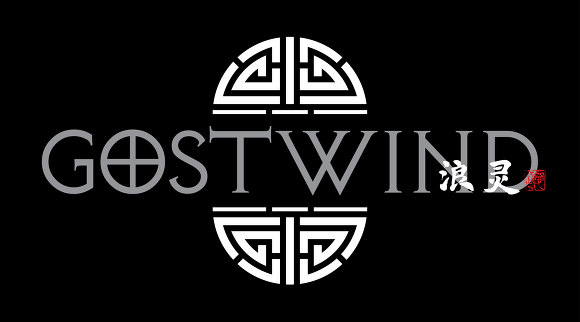
SEBASTIAN KLUTH: “Hello from Chicoutimi, Canada. How is life in Seoul in the beautiful Republic of Korea? Thank you a lot for accepting this great interview occasion. Could you please introduce yourselves to our readers? Who are you, what kind of music do you play and what’s the meaning behind your band name?”
RYOO KEUN-SANG: “Hi. My Name is Keun-Sang Ryoo. I’m the leader, composer and drummer in “Gostwind”. We basically play hard rock and we try to mix it with Korean folk music and our traditional culture. The band name “Gostwind” is derived from two words: “ghost” and ”wind”. “Ghost” stands for our spirit and soul for rock music and ‘wind’ is some new wave or real new wind that we wish to come over the world. A lot of people ask why we call ourselves ‘gost’ without ‘h’. We wanted our band name to be an easy name as well as our very own name. So the name ‘Gostwind’ has become our one and only name forever.”
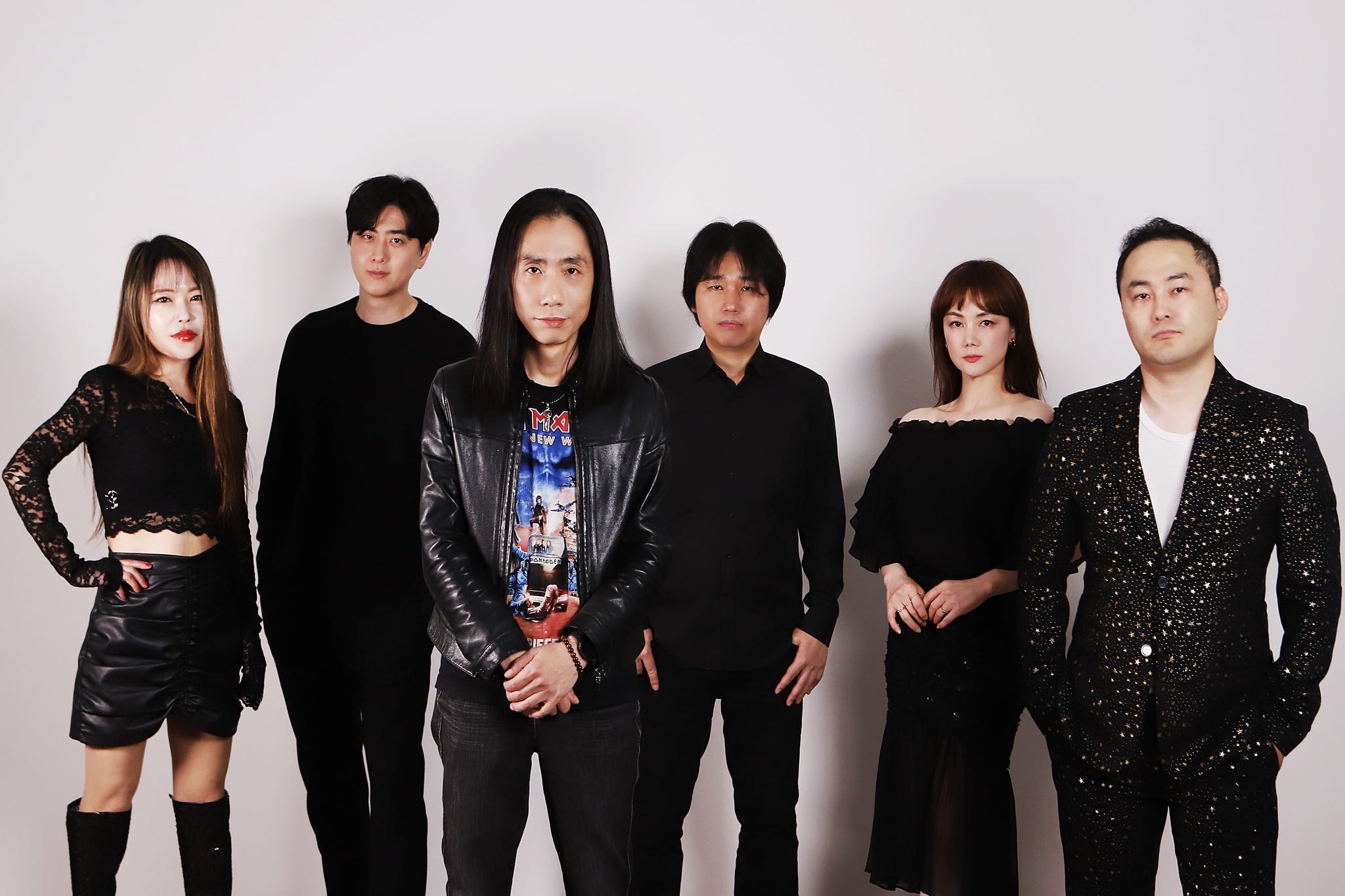
SEBASTIAN KLUTH: “If we take a look on your band logo, we can read that you describe yourselves as “a band for Cho-Sun Rock”. What does that mean to you?”
RYOO KEUN-SANG: “It is not complicated. Korean folk music developed very well during the Cho-sun Dynasty between 1392 and 1910 before our country became known as Korea. Our songs are influenced by Korean folk music and that’s why we have chosen that nick name.”

SEBASTIAN KLUTH: “Among others, you play a couple of quite exotic instruments that some of our readers might not know. What is a daegeum for example or a haegeum? What do these instruments sound like, how did you learn to play them and why did you integrate them to your band sound?”
RYOO KEUN-SANG: “Daegeum and Haegeum are very important Korean instruments for traditional Korean music. They are very old and have a very special sound. In Korea, there are special training courses to learn how to play these instruments at college and university for example. Daegeum is a kind of woodwind instrument made of bamboos and looks like a flute. Heageum is a kind of string instrument. Both instruments have a unique Korean sound. So when we write our songs, we focus on integrating these instruments to create authentic Korean tales and melodies.”

SEBASTIAN KLUTH: “That means that your lyrics are inspired by Korean culture. Can you tell us more about the lyrical concepts behind your three records “10,000 Years Ago”, “Korean Road” and finally “Kkokdugaksi”?”
RYOO KEUN-SANG: “We don’t have any special lyrical concept in each album. We simply write what we want to say. For example, we write lyrics about our own lives, sometimes we tell satire stories about the society or we sing about our resistant spirit that is shared with us by many other rock bands in the world. The only common rule for all our lyrics is that we are always expressing ourselves in Korean.”

SEBASTIAN KLUTH: “How was the reception of your unique concept and music in South Korea and elsewhere when you’ve started your band?”
RYOO KEUN-SANG: “In fact, we were a little bit afraid when we made our first original song because nobody had tried out something like our concept before. Since the release of our first album, many people said that our music is addictive, surprising and unique and it encouraged us to continue. Our first gig was then at a small live club in Seoul in 2005.”
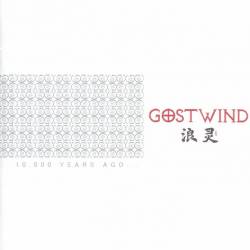
SEBASTIAN KLUTH: “You have released your first two records in not even two years but it took you over six years to release your third album. How comes that you’ve kicked off your career so quickly but took so much time to put out something new?”
RYOO KEUN-SANG: “After the release of our second album, we had a big problem with our agency about money matters. And we had also to replace several band members. But we never had some rest from our performances and composing processes in all these six years.”
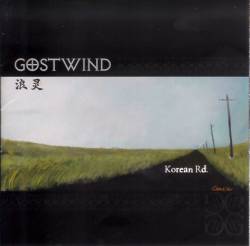
SEBASTIAN KLUTH: “By the way, are you able to live from your musical activities or do you still have other jobs in your everyday lives? How do you manage to deal with both your artistic creations and your private lives or professional careers?”
RYOO KEUN-SANG: “Each of our members still has another job. Eun-hyung, Seung-taek and I play at the same municipal orchestra now. Byung-chan is working for broadcasting music and effects. Jung-hyun also plays in a philharmonic orchestra as double bass player. Ran is involved in traditional Korean music and theater.”
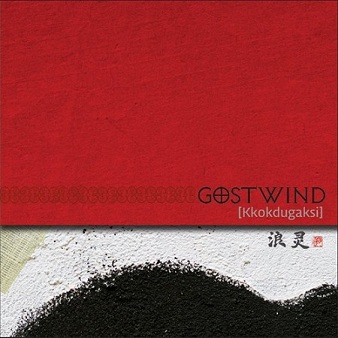
SEBASTIAN KLUTH: “Your music sounds very intellectual and well written and reminds me sometimes of classic music arrangements despite the heavy metal and folk influences. I guess that some of you have studied music and have acquired a lot of experience with these arrangements. Please tell us more about your professional knowledge and how it helps during your song writing.”
RYOO KEUN-SANG: “My father was a musician at a symphonic orchestra. He played the French Horn. So I'm into classical music and have made my very first experiences at a very young age. I have also studied classical music at a university in Germany. For that reason I can maybe arrange classical music naturally. The other composer Byung-chan has also many skills from his broadcasting production experience. And almost all members of Gostwind have acquired a lot of musical knowledge at Korean universities. It’s also crucial that the musical common denominator of all our members is heavy metal. I think all these reasons gave and give birth to our music.”
SEBASTIAN KLUTH: “Are you able to reproduce your detailed and impressive music live or do you change some parts of your songs?”
RYOO KEUN-SANG: “Sometimes we play some improvised songs on stage and the audience gets completely crazy!”
SEBASTIAN KLUTH: “Until now, what have been your best concert experiences? Have you ever opened or shared the stage with a famous act? Have you already played outside of your country?”
RYOO KEUN-SANG: “I participated with other bands in many kinds of rock or world music festivals in Korea. Among them, there also was a popular band called “Rage”. We have received once or twice the liaison casting for a gig outside of Korea but for some reason, the shows were always cancelled at the very last moment and we didn’t really get to know why. We are craving to finally make it to a concert in a foreign country.”

SEBASTIAN KLUTH: “Some people compare your sound with Germany’s “Haggard” or also with Swedish “Therion” for example. According to you, are there any bands outside of South Korea that impress and inspire you or that sound a little bit like you?”
RYOO KEUN-SANG: “Many people compare our music to other bands. Of course, since I was young, I have enjoyed a lot of rock music. But we have our very own experiences that enable us to create our very own music in the end.”

SEBASTIAN KLUTH: “What is the musical evolution between your three records? How would you categorize, describe and judge them today?”
RYOO KEUN-SANG: “Our first album “10,000 Years Ago” was just some sort of a mixture working for both rock and traditional Korean instruments. We were then looking for new paths to create a more Korean style for our second record “Korean Road”. Our third album ‘Kkokdugaksi’ has added even more of Korean culture and rhythm to the sound. The original name of ‘Kkokdugaksi’ is ‘Kkokdugaksi Noleum’. It is a very old Korean folk puppet play. The melody of the original ‘Kkodugksi’ was a major key. But I ended up arranging it as a minor key to fit it to Gostwind’s musical color. And I have used a lot of rhythms from the “Samulnori”, a traditional Korean percussion ensemble, in other songs as well.”
SEBASTIAN KLUTH: “I’ve listened to many of your amazing songs on the internet and I guess that other people might do so as well after reading this interview. Is there any possibility for us international fans to purchase your original records outside of South Korea?”
RYOO KEUN-SANG: “First of all, I would like to say thank you. But sadly, it is still impossible to buy our original albums outside of South Korea. But my agency is working hard to distribute our music outside of Korea right now. Please be patient and wait until it gets officially released in Canada.”
SEBASTIAN KLUTH: “Let’s talk a little bit more about Korean culture. Which historic characters or events are the most important or intriguing ones to you and why?”
RYOO KEUN-SANG: “Korea has a history of 5000 years. It is a peninsula that is geographically located between China and Japan. Korea has been surviving as an independent country even though there have been so many interventions and invasions from those two countries as well as cultural exchanges and influences. Korea still has its own unique culture. Korea is the country which has the greatest number of the cultural heritages registered at the UNESCO. In Korea, there are so many great historical characters and it’s hard to only choose one or two distinctive examples. So let me give you some more details next time. Sorry.”
SEBASTIAN KLUTH: “I’m also very impressed by Korean movies and think that some of them are among the world’s greatest ones. Are there some movies or also books or documentaries that have inspired your lyrics and could you tell us more about them?”
RYOO KEUN-SANG: “I also love Korean movies and some Korean movie directors but I’m actually never inspired by movies or books when I create a song. And I do not like Korean movies that just imitate Hollywood movies.”
SEBASTIAN KLUTH: “South Korea is internationally known for many K-Pop artists like “Seo-Taiji and the Boys”, “Girls’ Generation” or also “PSY”. What do you think of that phenomenon? Does it represent well Korea’s musical culture to foreigners?”
RYOO KEUN-SANG: “I think they are the musicians or dancers for business reasons. They only vaguely imitate foreign pop music in Korean language. They might look and sound Korean, but only for international audiences. Therefore, they cannot be seen as representatives of Korean culture.”
SEBASTIAN KLUTH: “On the other side, we don’t hear a lot about Korean rock and metal bands. What are your favourite Korean bands? Could you also tell us more about important concert venues or festivals in your country?”
RYOO KEUN-SANG: “I have also my favourite Korean bands: “Silent Eye”, “Broken Valentine”, “Down In A Hole” and so on… There are several rock festivals in Korea as well: “Busan International Rock Festival”, “Incheon Pentaport Rock Festival”, “Jisan World Rock Festival” and so on…”
SEBASTIAN KLUTH: “We already approach the end of our interview now. Tell me how you’ve lived the first half of the year 2013 with the release of your new album and what can we expect from you for the last four or five months of this year?”
RYOO KEUN-SANG: “This autumn, there are three more exclusive performances by Gostwind. We will also take part of one music festival. In addition to this, we are already getting prepared for giving multiple small and big club gigs.”
SEBASTIAN KLUTH: “Where would you like to you see your band Gostwind in ten years from now? Do you still have certain dreams you want to realize or ambitious projects you would like to work on over the next years?”
RYOO KEUN-SANG: “Naturally, we need to create more albums. One day, I want to try to play a very big gig with orchestra and a complete choir. And we want to inform as many people as possible about Korean culture and music throughout the entire world through our activities with Gostwind.”
SEBASTIAN KLUTH: “Thanks a lot for taking your time for this interview again. I hope you had a great time and I want to try to spread your name a little bit more to make people from all around the world discover your unique music. As always, the last words belong to the artists. What is the final message you would like to send to our international readers?”
RYOO KEUN-SANG: “I have had a lot of interviews in Korea, but this special interview seemed to me like a master´s degree thesis. I mean, we really had so deep and meaningful discussions. Thank you so much! I think that cultures are much stronger weapons than guns. In that sense, Gostwind desires to become Korea's strongest representative weapon. My last words for the readers are very simple: Rock will never die!”
-
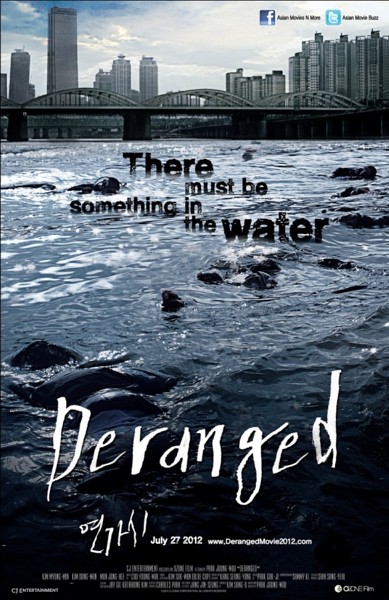
"Deranged" is an ecological thriller from South Korea with a fair amount of action and a few drama elements as well. Fans of movies such as "The Host" or "Tidal Wave" will also enjoy this one.
The movie tells us the story of two brothers who don't talk to each other anymore since a tragic incident in the past. The intelligent Jae- Hyeok is a disgruntled sales executioner in a pharmaceutical company and has to do a few very degrading jobs to make his wife and two children live a modest live. His brother Jae-Pil is a cop with a bad reputation but a few good connections who is in a relationship with a doctor. When a mysterious disease breaks out in the country, the wife and children of Jae-Hyeok are among the one million infected people. The two brothers need to work together and reconcile and soon realize that the catastrophe has something to do with parasites living in water who nest in human bodies and end up killing them by drowning them or breaking out of their stomaches. As investigations progress, they realize that the infections didn't break out by pure coincidence and are about to discover a conspiracy. Meanwhile, the health of Jae-Hyeok's wife and children decreases and the two brothers desperately need to get their hands on an obscure and rare medicament that could save them.
This pandemic movie convinces with a very solid acting, a well done cinematography with a few well done but not overwhelming special effects and an entertaining pace. There really isn't much wrong with the movie but I thought that the little twist in this movie was too generic and predictable as one feels that one has seen this kind of story line a couple of times before in Hollywood. Towards the end, the two brothers run a little bit too much around to find the medicament and the concept gets just a little bit repetitive. Apart of that, a few more scenes could have been spend on the relationship between the two brother but the movie rather turns out to focus on the sometimes difficult relationship between the father and his wife and children that is very well done and touching.
Those who like pandemic thrillers and modern South Korean cinema should purchase this film and will be well entertained. It's nothing groundbreaking or new but the film is on the same high level as the Hollywood movies of the same kind inspired by the novels of Robin Cook, Michael Crichton or Stephen King for example.













